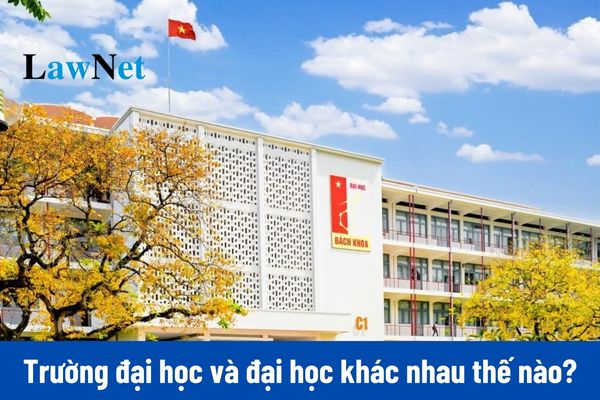What are differences between universities and parent universities in Vietnam? What are the conditions for converting a university into parent university in Vietnam?
What are differences between universities and parent universities in Vietnam?
Based on Article 4 of the Law on Higher Education 2012 (amended by Clause 2, Article 1 of the Amended Law on Higher Education 2018), there are provisions regarding universities and parent universities as follows:
Terminology Explanation
In this Law, the following terms are defined as follows:
- A higher education institution is an educational establishment belonging to the national education system, performing the function of training at higher education levels, engaging in scientific and technological activities, serving the community.
- A university or academy (hereafter collectively referred to as a university) is a higher education institution that conducts multi-disciplinary training and research, organized according to this Law.
- A parent university is a higher education institution that conducts training and research across multiple fields, organized according to this Law; the constituent units of a university jointly implement unified goals, missions, and tasks.
...
Thus, a university is an institution that provides training in multiple disciplines. Meanwhile, a parent university is an institution that offers training across various fields, with its constituent units working together to achieve common objectives, missions, and tasks. Therefore, a parent university will include universities.

What are differences between universities and parent universities in Vietnam? (Image from the Internet)
What are the conditions for converting a university into parent university in Vietnam?
According to Clause 1, Article 4 of Decree 99/2019/ND-CP, regulations on the conditions for converting a university into parent university in Vietnam are as follows:
- The university must be recognized as meeting the quality standards of a higher education institution by a legitimate educational quality accreditation organization;
- There must be at least 3 schools within the university established according to Clause 4, Article 4 of Decree 99/2019/ND-CP;
There must be at least 10 fields of study at the doctoral level; a formal training size of over 15,000 students;
- Approval from the managing authority is required for public universities; consensus from investors representing at least 75% of total contributed capital is required for private universities, including those operating non-profit.
What is the State Policy on higher education development in Vietnam?
According to Article 12 of the Law on Higher Education 2012 (amended by Clause 7, Article 1 of the Amended Law on Higher Education 2018), the State currently outlines the following orientations on higher education development policy:
- Developing higher education to train high-level human resources, meeting the demands of socio-economic development, ensuring national defense and security.
- Allocating budget and resources for higher education on competitive, equal, and efficient principles through investment expenditures, research and development spending, research and training orders, scholarships, student loans, and other forms.
- Prioritizing, incentivizing land, tax, credit, and other policies for higher education development.
- Prioritizing investment to develop certain higher education institutions, regional and international-level training disciplines, and high-quality teacher training institutions; developing specific disciplines, higher education institutions capable of executing national strategic tasks, and regional developmental tasks.
- Encouraging the structuring, merging of parent universities into large universities; applying technology in higher education.
- Implementing private investment in higher education, encouraging the development of private higher education institutions.
- Giving priority to non-profit-operated private higher education institutions.
- Providing preferential policies for organizations, enterprises, and individuals investing in education and training, science, and technology activities at higher education institutions.
- Implementing tax exemption and reduction policies for donated assets, supporting higher education, granting scholarships, and participating in student credit programs.
- Establishing synchronized policies to ensure the autonomy of higher education institutions linked to accountability.
- Linking training with labor market demands, fostering scientific and technological research and application; promoting cooperation between higher education institutions and enterprises, scientific and technological organizations; granting tax incentives for higher education institutions' scientific and technological products.
- Encouraging agencies, organizations, enterprises to receive and facilitate students and lecturers for practice, internships, scientific research, and technology transfer, contributing to improved training quality.
- Attracting, retaining, and adequately remunerating to improve the quality of lecturers; focusing on developing a team of lecturers with doctoral degrees and leading professors in higher education institutions.
- Giving priority to those benefiting from social policies, ethnic minorities, individuals in regions with particularly difficult socio-economic conditions, students in specific disciplines needed for socio-economic development; ensuring gender equality in higher education.
- Encouraging and promoting international cooperation and integration to develop Vietnam's higher education to regional and global standards.

